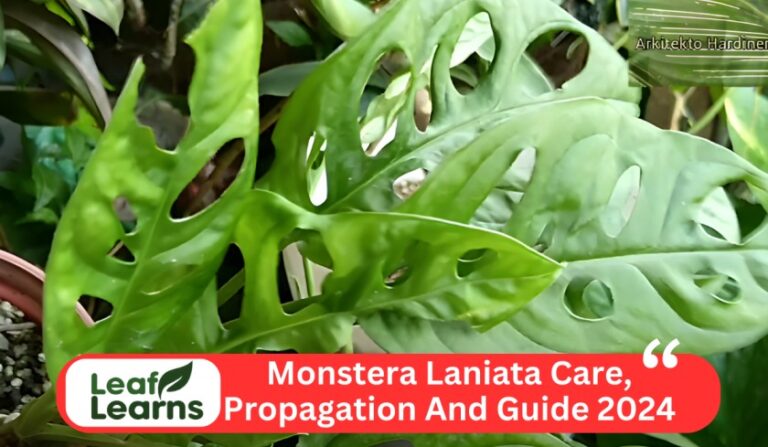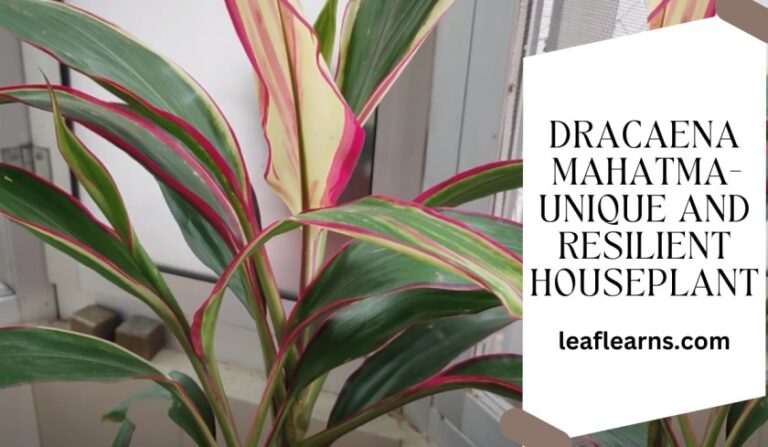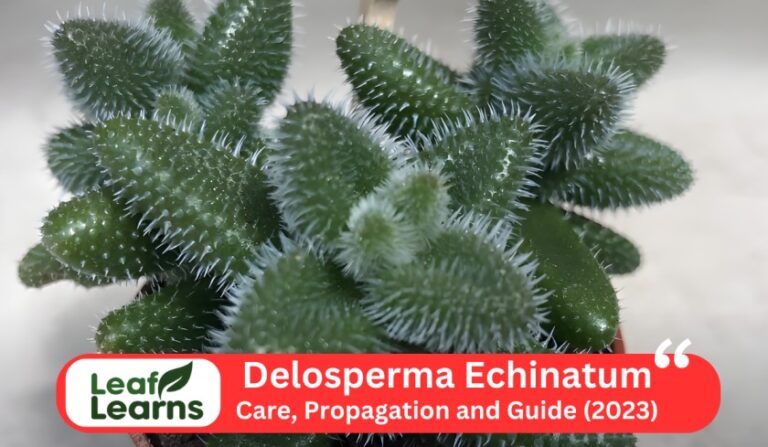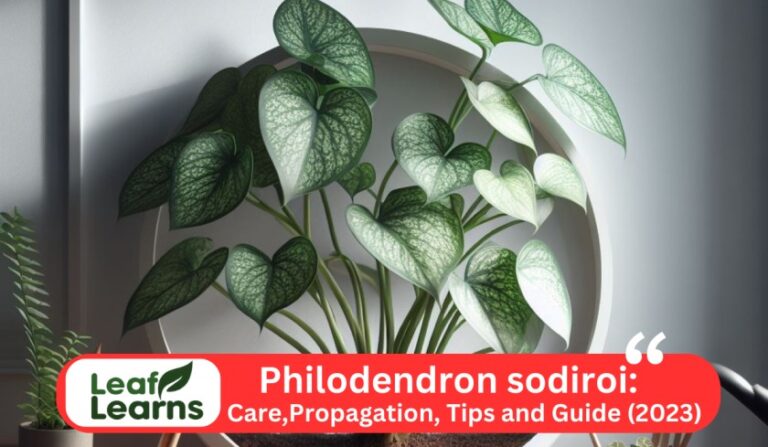Thai Constellation Monstera Care and Propagation (2023)
The Thai Constellation Monstera are also called Monstera deliciosa ‘Thai Constellation’ is a stunning perennial. This plant which is native to Thailand, may flourish indoors. This plant is a great show opener with its heart-shaped, variegated green and creamy-white leaves that grow to sizes of 10 to 12 inches in diameter.
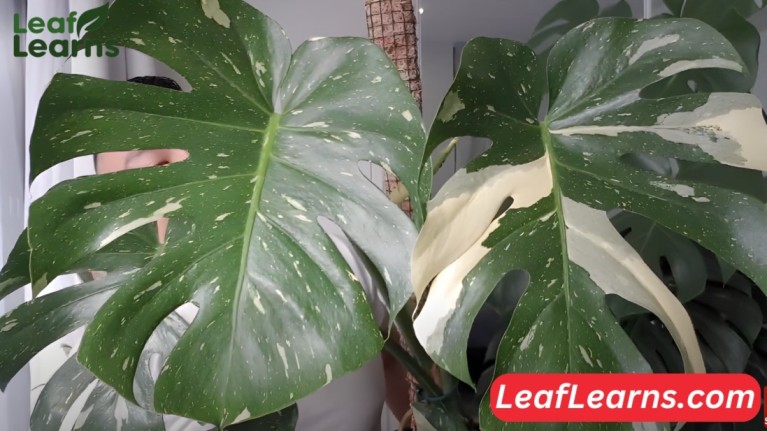
Contents
- 1 Characteristics
- 2 What’s Unique About Thai Constellation Monstera?
- 3 Top Care Tips
- 4 Care for Thai Constellation Monstera
- 5 Propagating Thai Constellation Monstera
- 6 Pruning
- 7 Repotting of Thai-Constellation Monstera
- 8 Flowering and Foliage
- 9 Overwintering
- 10 Common Pests and Diseases
- 11 Problems and Solutions
- 12 Toxicity of Thai Constellation-Monstera
- 13 Uses/Benefits
- 14 Where to Buy Monstera Thai Constellation: Options and Considerations
- 15 Monstera Thai Constellation: Guide for Healthy Growth
- 16 Conclusion
- 17 FAQs
Characteristics
It rarely blooms indoors, but when it does, a fragrant spadix is produced. This beauty can flourish with a well-draining, aerated potting mix, bright, indirect light, and some indirect sunshine.
The optimal range for temperature and humidity is 65-80°F (18-27°C) and 60-80%, respectively. Throughout the growth season, regular feedings with a balanced, water-soluble fertilizer keep it healthy.
Keep out for possible pests including mealybugs, aphids, and spider mites. Additionally, keep in mind that it might irritate the skin and is only mildly poisonous if consumed.
As a decorative houseplant, the Thai Constellation Monstera enhances the beauty and design of rooms.
| Common Name | Thai Constellation-Monstera |
| Scientific Name | Monstera deliciosa ‘Thai Constellation’ |
| Family | Araceae |
| Origin | Thailand |
| Plant Type | Perennial, Epiphytic |
| Size | Up to 2-3 feet indoors |
| Leaf Colour | Variegated green and creamy-white |
| Leaf Size | Large, heart-shaped, 10-12 inches in diameter |
| Flower | Rarely flowers indoors, when it does, produces a fragrant spadix |
| Light | Bright, indirect light with some dappled sunlight |
| Water | Allow the top 1-2 inches of soil to dry between watering |
| Soil | Well-draining, aerated potting mix |
| Temperature | 65-80°F (18-27°C) |
| Humidity | Prefers high humidity levels, around 60-80% |
| Fertilizer | Balanced, water-soluble fertilizer during the growing season |
| Pests | Spider mites, aphids, and mealybugs |
| Toxicity | Mildly toxic if ingested, can cause skin irritation |
| Uses | Ornamental houseplant, adds beauty and style to indoor spaces |
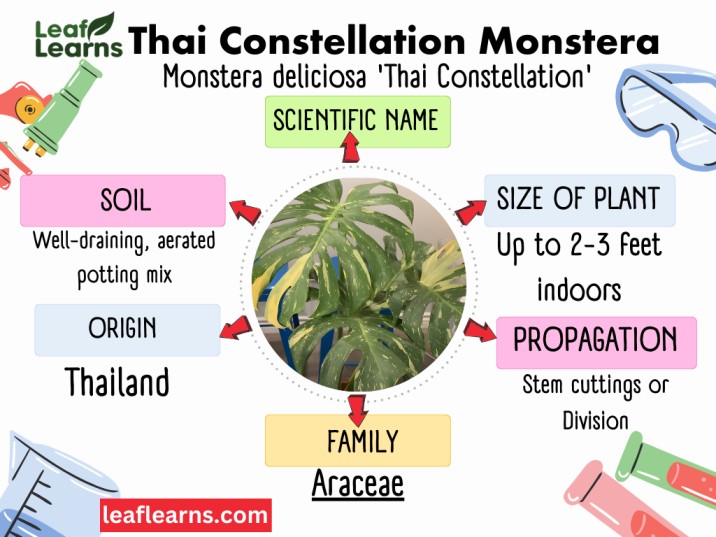
What’s Unique About Thai Constellation Monstera?
The gorgeous variegated leaves of the Thai-Constellation Monstera, which have an eye-catching contrast of green and creamy-white hues, are what distinguish this plant from others.
It stands out because of its unique and striking variegation pattern, making it a popular option for plant lovers wanting to add a touch of elegance to their interior environments.
Top Care Tips
Proper Lighting: For amazing variegated foliage, give your Thai Constellation-Monstera strong, indirect sunshine.
Balanced Watering: To avoid root rot, keep the soil just a little bit dry between waterings.
Selecting soil that drains adequately can help you sustain healthy growth.
Maintain humidity for healthy Monstera; spray plants or use a humidifier.
Regular Pruning: Remove damaged leaves for a Thai Constellation-Monstera that is taller and bushier.
Care for Thai Constellation Monstera
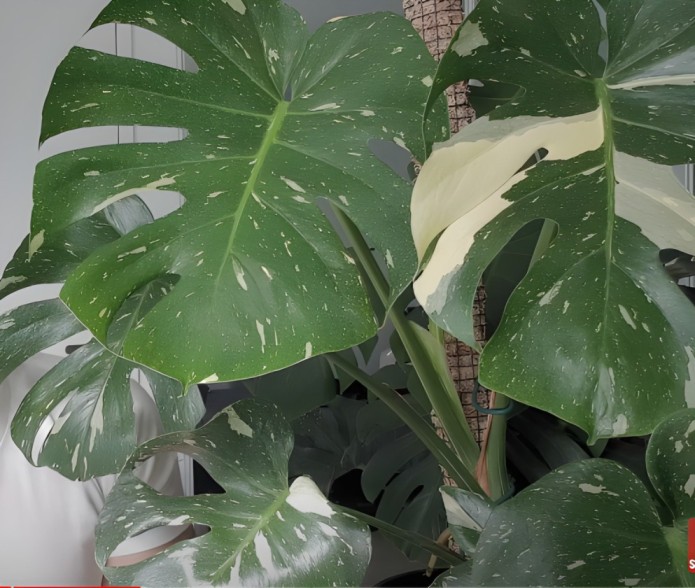
Light Requirement
Take great attention to the Thai-Constellation Monstera’s light needs for the best maintenance. These plants benefit from direct, bright sunshine.
Make sure they get enough light, but keep them out of the sun’s direct rays because it might damage their lovely variegated leaves.
To get the ideal balance, choose a location near a window with filtered sunlight, or use sheer curtains.
Water Requirements
You must fulfill the water needs of your Thai Constellation plant in order to take good care of it. When the top inch of soil dries up, this plant loves to be watered.

A little soil drying time should occur between watering to prevent root rot caused by over watering. Your Monstera thrives if you keep that balance.
Soil Requirement
This plant grows well in soil that drains well and keeps water from collecting around its roots.
To maintain a perfect level of soil moisture, use an airy, organic-rich mixture. This keeps your plant healthy and colorful by preventing over watering and root rot.
Temperature Requirement
Understanding the Thai Constellation temperature requirements is essential for maintaining its health. Room temperatures between 65 and 80 °F (18 and 27 °C) are ideal for this plant.
Keep your Monstera away from draughts and sharp temperature drops since these might stress it.
Humidity Requirement
Maintain optimal humidity levels to take good care of your Thai Monstera plant. The ideal humidity range for this lovely plant is between 60 and 80 percent.
You may do this by placing a bowl of water nearby, spraying the leaves, or using a humidifier.
Your Monstera will remain healthy and have its magnificent variegated leaves at their finest with the right humidity.
Fertilizer Requirement
Make sure the Thai Monstera plant gets the proper fertilizer for a healthy plant. Usually every 4-to 6 weeks during the growing season, this stunning plant enjoys a balanced, water-soluble fertilizer.
Reduce the frequency throughout the winter months when it is dormant to keep it healthy.
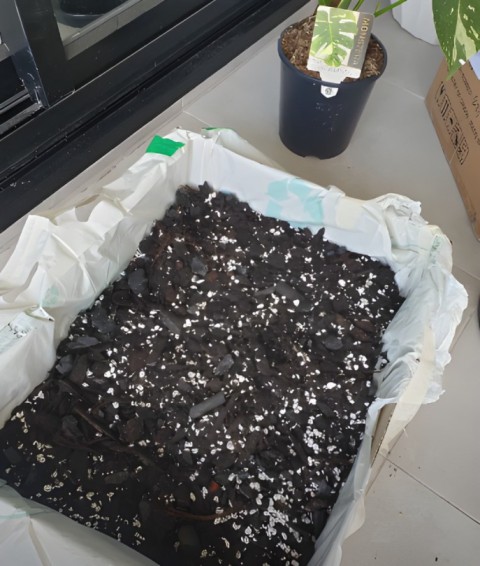
Potting Requirement
Starting with its potting needs, caring for your Thai-Constellation Monstera is easy. Select a well-draining container for this beautiful plant to maintain its health.
The pot’s drainage system prevents your Monstera from over watering, keeping it healthy and bright. A flourishing plant brings beauty to your setting.
Propagating Thai Constellation Monstera
The Thai monstera may be propagated via division and stem cuttings. The plant may be propagated using this technique the best. Before using any cutting equipment, first, sterilize them. Also, don’t forget to put on gloves for protection before doing so.
Pruning
For a rich, well-shaped plant, Thai Constellation-Monstera requires regular pruning. To preserve its attractiveness and promote new development, cut any leaves that are yellow or damaged on a regular basis.
Additionally, pruning prevents overcrowding enabling the plant to breathe and grow.
It’s an easy approach to keep your Monstera flourishing in your area and maintain its aesthetic appeal.
Repotting of Thai-Constellation Monstera
- For the health of your Thai Monstera plant, repotting is necessary. Repotting is necessary when the roots outgrow the present container or the soil becomes tired.
- Select a larger container, move the plant carefully, and then add new, well-draining soil.
- This promotes development and guarantees that your Monstera will continue to grow and flourish.
- Keep in mind that regular repotting maintains your plant healthy and avoids root congestion.
When to repot Monstera Thai constellation
Repot your Monstera Thai Constellation in the spring every two to three years, or if the roots overrun the plant’s existing container or it gets root-bound.
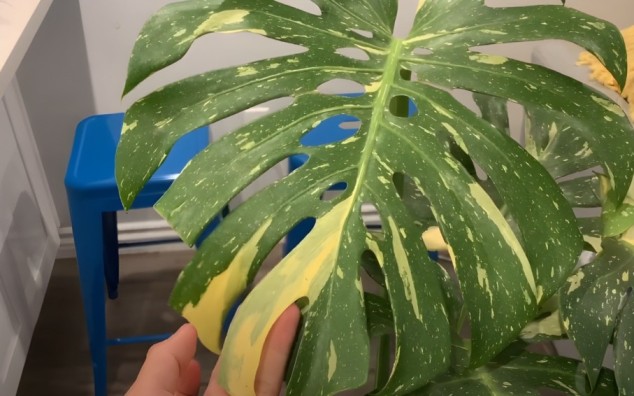
Flowering and Foliage
Instead of its blooms, the Thai Constellation-Monstera is valued for its appealing leaves. It is a magnificent addition to any room because to the gorgeous white and green marbled patterns on its leaves.
However, having this plant blossom inside is an unusual sight. The plant’s true attractiveness comes in its distinctive and variegated leaves.
And which give your home decor a touch of elegance despite the little, uninteresting blooms.
Overwintering
Maintain indoor temperatures between 60 and 75 degrees Fahrenheit and protect your Thai-Constellation Monstera from chilly droughts in order to successfully overwinter it.
Reduce irrigation but don’t let the soil entirely dry up. For a healthy plant, be sure to regularly check for pests, give it indirect light, and keep the humidity level stable.
Common Pests and Diseases
Your Thai Monstera plant may have issues from common pests and diseases. Keep a look out for any insects that could infest its rich leaves, such as aphids, mealybugs, or spider mites.
Regularly examine your plant for these little pests and apply a mild insecticidal soap to repel them.
To keep a healthy, disease-resistant plant, let the soil dry out between watering since excessive watering might result in root rot.
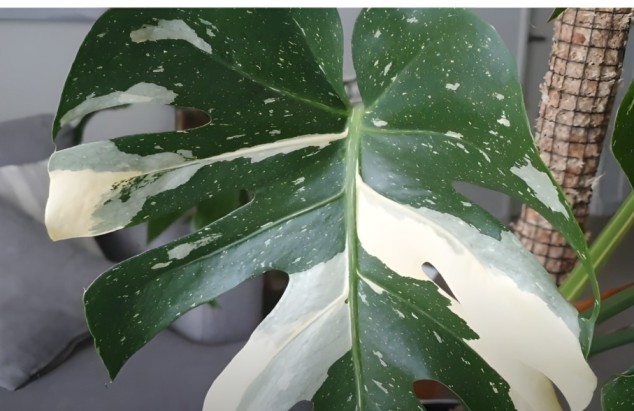
Problems and Solutions
Problem: Yellowing Leaves – If you notice yellowing leaves on your Thai-Constellation Monstera, it may be due to over watering.
Solution: In order to avoid root rot and to guarantee appropriate drainage in the pot, let the soil dry out between watering.
Problem: Brown Spots on Leaves – Brown spots can be a sign of too much direct sunlight.
Solution: Move the plant to a spot with bright, indirect light to avoid leaf damage.
Problem: Leggy Growth – Insufficient light can cause your Monstera to become leggy.
Solution: To promote bushier development, place the plant in a well-lit location or use artificial grow lights.
Problem: Pest Infestation – Common pests like spider mites can affect Monstera plants.
Solution: Check your plant frequently for pests, and if you find any, wash the leaves with a moist cloth or treat them with insecticidal soap.
Problem: Drooping Leaves – Over watering or root issues can lead to drooping leaves.
Solution: If root issues persist, change your watering schedule, check your drainage, and repot your plants.
Problem: Slow Growth – Inadequate nutrition might cause slow growth.
Solution: During the growing season, feed your Monstera with a balanced fertilizer to encourage wholesome and vigorous growth.
Problem: Monstera Thai constellation leaves curling
Solution: To increase humidity and avoid leaf curling, spray the plant or use a humidifier, and make sure the soil is always moist but not wet.
Toxicity of Thai Constellation-Monstera
Toxicity for Humans
Both humans and their pets may be poisoned by the Thai-Constellation Monstera. The plant contains oxides, which when consumed or simply touched, can irritate and be uncomfortable.
This gorgeous houseplant must be kept out of children’s reach and handled carefully to avoid any skin or stomach problems.
Toxicity for Cats and Dogs
Cats and dogs are a little poisonous to Thai Constellation-Monstera. Drooling, tapping at the lips, or stomach discomfort may result from chewing or eating the plant’s leaves.
Place the plant out of your pet’s reach to stop unwanted nibbling, and call your veterinarian if your pet shows any worrying signs after coming into touch with the plant.
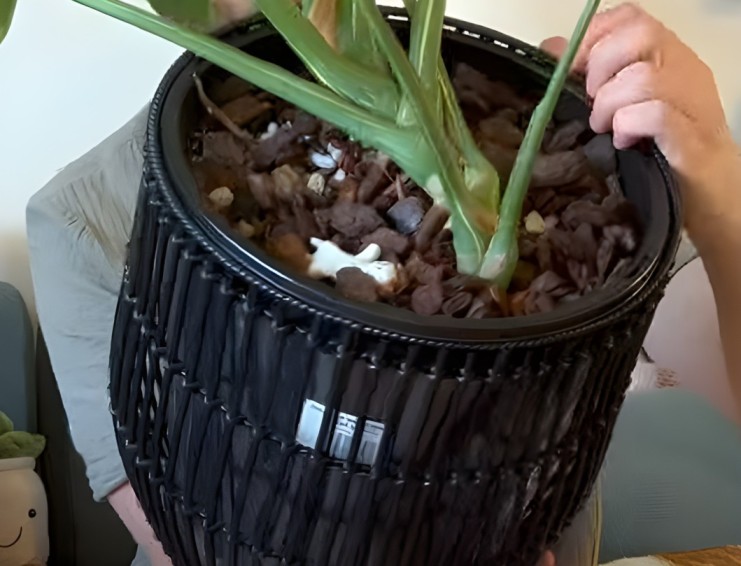
Uses/Benefits
Thai Constellation-Monstera is an eye-catching addition to homes, businesses, or other interior settings, increasing aesthetics with its distinctive variegated leaves.
Air purification: By removing common contaminants, this plant helps to purify indoor air, fostering a better living environment.
Its luxuriant growth can serve as a natural room divider, offering seclusion and defining areas within a room.
Tension reduction: Taking care of this plant may be a soothing and therapeutic activity that encourages relaxation and reduces tension.
Conversation Starter: Due of its unusual look, tourists frequently compliment and engage in discussions on the Monstera.
Instagram-Worthy: It is a popular choice for social media photographs and home design inspiration because of its eye-catching leaves.
Where to Buy Monstera Thai Constellation: Options and Considerations
Monstera Thai Constellation is a stunning variegated plant that can add a touch of elegance to any space. Whether you’re a seasoned plant enthusiast or a beginner looking to bring some greenery into your life, you might be wondering where to buy Monstera Thai Constellation.
The plant is highly sought after and can be found in various places. You can purchase Monstera Thai Constellation from local nurseries, online retailers, or even through social media platforms like eBay and Etsy.
Be cautious when choosing a seller, and ensure they have a good reputation for healthy plants. Prices for Monstera Thai Constellation can vary depending on factors like size, variegation, and availability. If you’re patient, you might also consider growing it from seeds, although this can be a bit more challenging.
Monstera Thai Constellation: Guide for Healthy Growth
Caring for Monstera Thai Constellation can be rewarding but requires attention to detail. This plant is sensitive to changes in light and humidity, and if not properly cared for, you might notice brown spots on the leaves or even leaf curling.
To ensure the best growth, provide bright, indirect light and maintain proper humidity levels. When it comes to fertilizing, make sure to choose the best fertilizer for Monstera Thai Constellation, as this will help maintain its vibrant variegation.
Regularly inspect your plant for any issues, and consider taking cuttings to propagate and share with other plant enthusiasts. With the right care and patience, your Monstera Thai Constellation will thrive and grow beautifully.
Conclusion
In conclusion, the beautiful variegated leaves of the Thai Constellation-Monstera are praised, making it a sought-after option for indoor environments.
A plant’s health depends on providing the right amount of light, water, humidity, and nutrients, as well as performing tasks like repotting and insect control.
This plant is a well-liked present and topic of conversation since it improves the appearance of interior spaces, the quality of the air, and stress levels.
FAQs
Why is the Monstera Thai Constellation so expensive?
Due of its rarity and distinctive variegated leaves, the Monstera Thai Constellation commands a high price from collectors of plants.
Is Thai Constellation Monstera rare?
Yes, Due to its unique variegation pattern, which is characterized by white marbled streaks on green leaves, the Thai Constellation Monstera is regarded as uncommon.
Why is the variegated Monstera Thai Constellation so expensive?
Due to its extraordinary variegation, which happens at times in nature, the varied Monstera Thai Constellation is a valued and costly plant.
What is the difference between the Monstera White Tiger and Thai Constellation?
Although both are variegated Monstera types, the Thai Constellation has cream-colored striping on green foliage while the White Tiger often has white or silvery stripes mimicking a tiger’s pattern.
How much is Thai Constellation worth?
A Thai Constellation Monstera’s cost can vary greatly depending on its size and availability, but it is usually regarded as a high-value plant that frequently commands premium prices.
Is the Thai Constellation a climber?
Yes, this plant can climb and is often trained to grow vertically, but it can also be maintained in a bushier form.
Is the Thai Constellation stable?
The Thai Constellation has a variable level of variegation stability. considerable plants successfully maintain their variegation, but others may display considerable instability, with some areas turning uniform green.
Can the Thai Constellation revert?
Yes, Thai Constellation Monstera plants with variegated foliage may revert, producing patches of entirely green leaves. Such sections can be pruned to preserve the variegation.
How much sun does a Thai Constellation need?
Thai Constellation Monstera prefers bright, indirect sunlight. Avoid exposing it to direct sun, which can scorch its variegated leaves.
Can I put my Thai Constellation in water?
Cuttings of the Thai Constellation can be rooted in water while being propagated. For optimal development and health, established plants should be potted in well-draining soil.


